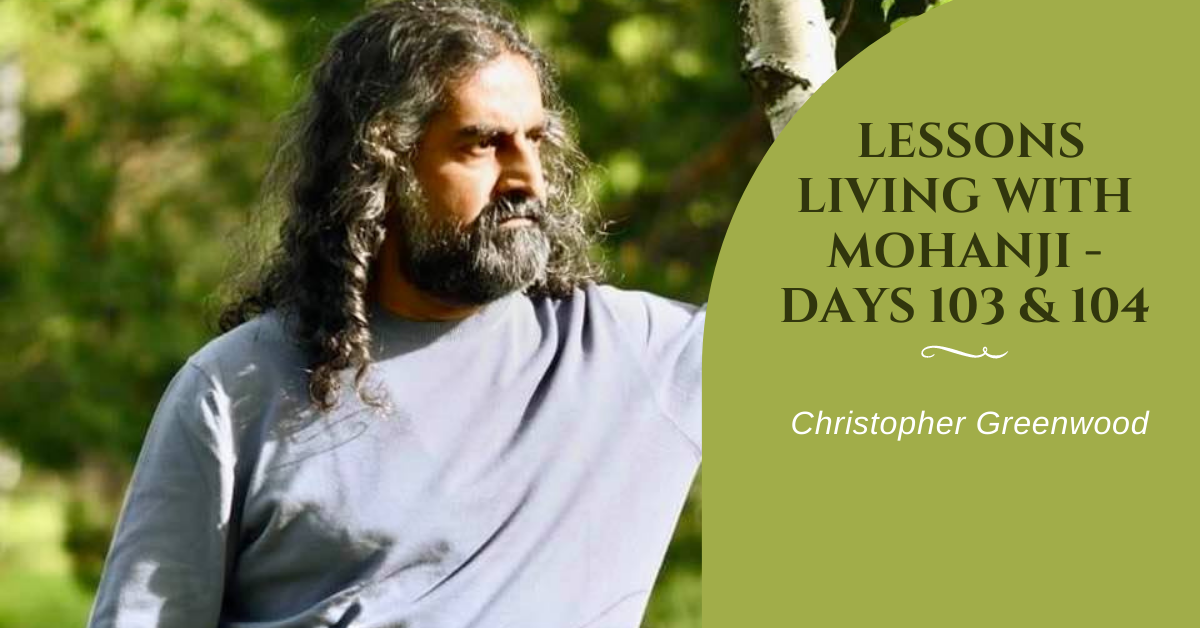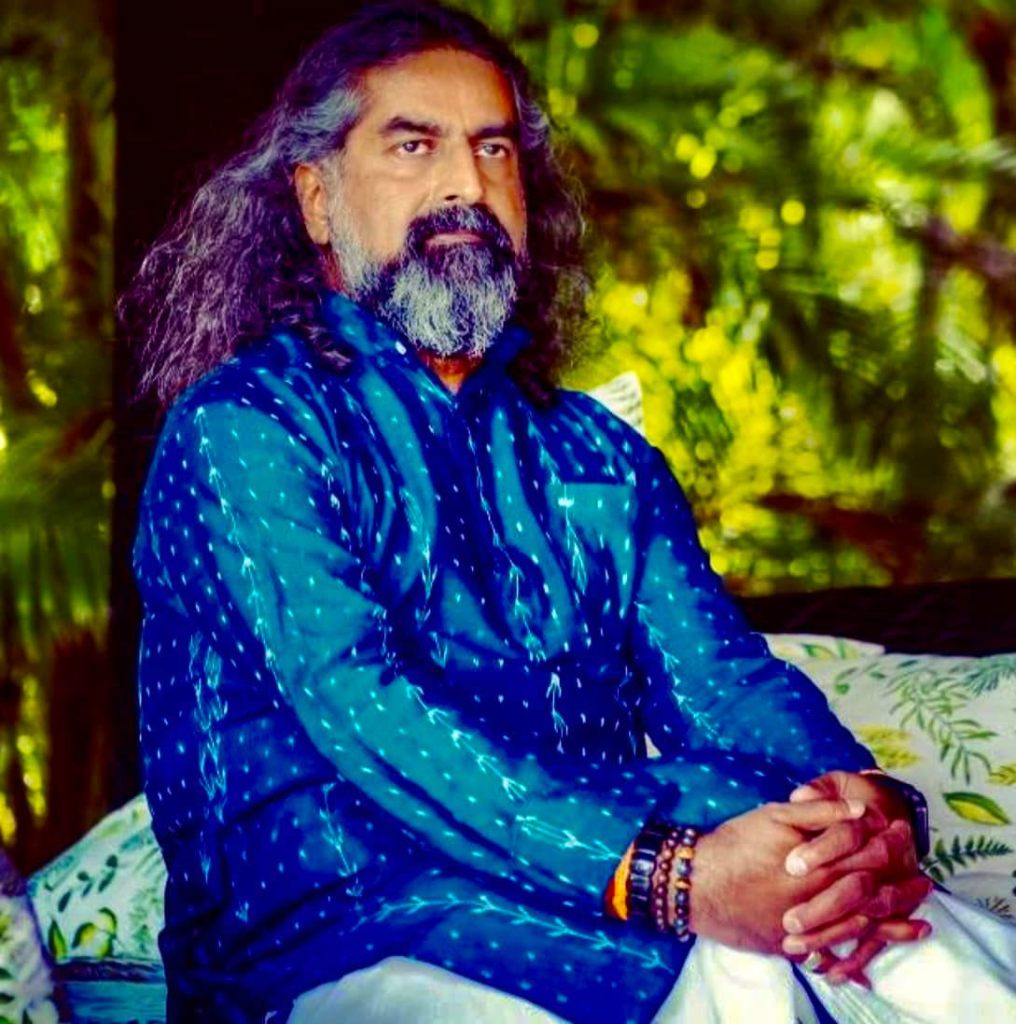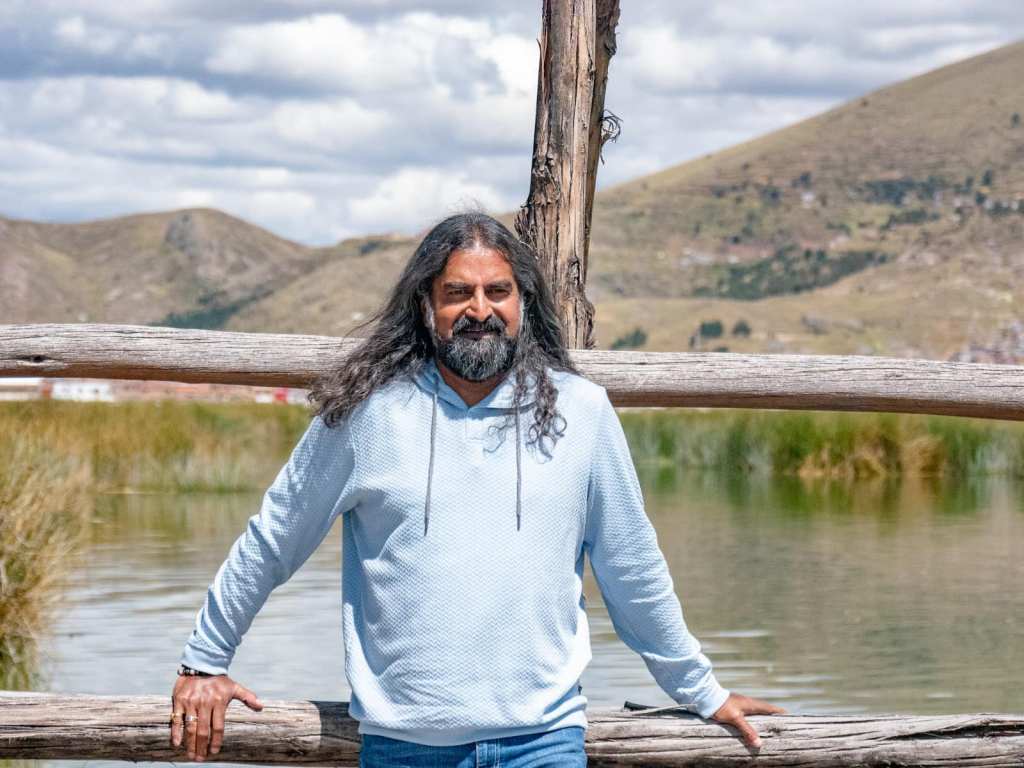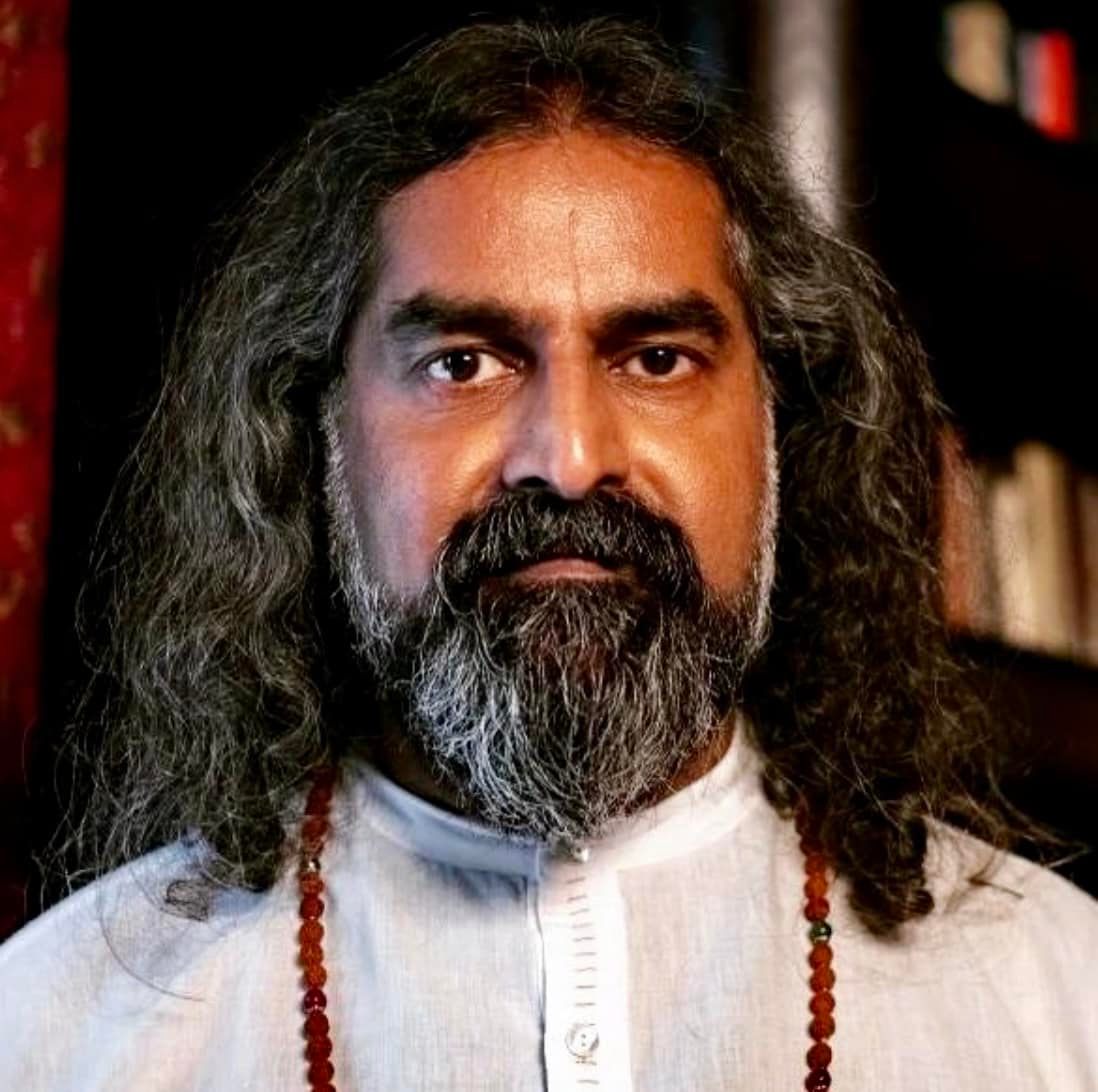by Christopher Greenwood
Day 103 Lesson – Mohanji’s Birthday – Commanding Power ‘Stories of a King’
Good morning everybody; I hope that you’re doing well.
Today is a special day being Mohanji’s birthday. It is a day of celebration across the Mohanji platforms. People use this opportunity to share their thanks and gratitude to Mohanji; launch events, complete major activities, and serve the needy. Mohanji has always said that serving the helpless is serving him – one of the best gifts we can give Mohanji is to serve the needy. Many food and clothing donations are happening through Ammucare, ACT Foundation, and the Act4Hunger platforms.
Later today, Mohanji will speak at a live satsang on the Mohanji official YouTube channel. I have spoken before in previous voice recordings that Mohanji is here for the world. Until I started living with him, I never fully understood this because the world I knew was not like that.
The world has a disposition of greed, competition, conquest and people in this mad rush to acquire as much as they can, trampling over each other in the process. Mohanji is a true living example of the opposite. What he has accomplished and what we are all part of will set the trend for generations to come.
I was thinking of birthdays and remembered some stories shared by Mohanji at a recent trip to Kerala, where he spoke about a rarely known king from the area called Sakthan Thampuran – ruler of the Kingdom of Cochin. We were in Thrissur, where Sakthan Thampuran lived long ago. The lessons that call out from these stories convey the importance of Iccha Shakti (Will Power) and Aagya Shakti (Commanding Power), especially commanding power. They are a must listen!
Mohanji enthusiastically shared many stories about this king with much familiarity and veracity, which was interesting because I’ve heard people say before that Mohanji spent many previous lives as a king. That’s why even now, he lives very humbly and takes nothing, and he has that character trait, that presence of regency, of royalty. He was conferred the title of Raja Yogi. There is the story of when he visited Saint Ganeshanda Giri, a powerful Master and a devotee of Sai Baba to whom Baba spoke at 6 am every morning. Baba told him to put up Mohanji at a fine hotel because Mohanji had been a royal in all his previous births.
Mohanji has never confirmed or spoken about his past lives to me. He’s only said that he is Mohanji, and that’s his relevance in the world. But when I heard the story of this king, I couldn’t help but find very similar parallels in style. Mohanji loved this king, his style, humour, and ability to get things done. The king was fierce and ferocious, and some say that he was even an avatar of Narasimha, the ferocious form of Vishnu. People would pee in their pants in front of him because he had a reputation for simply chopping heads, as that was his solution to justice, but all dharmic.
As a thank you to Mohanji, I share this story, and some of the things which I see are similar. This king, Sakthan Thampuran, had a commanding power, and he was completely unorthodox. Some would say probably crazy, but he got things done in his way. During the time he ruled, the law was maintained, people were safe, and the kingdom was peaceful.
There’s one story where he disguised as a forest dweller and went into the forest with some basic cooking utensils, some basic food, and he would sit there in the forest to check that the animals were okay. One day a Swami passed by and said, “Maharaj (king)?” The king said, “How did you notice?” Swami replied, “You can’t be mistaken; no matter what clothing you wear, you’ll still be known and seen as a king.”
Whenever there was trouble in a village – like crime, dispute or something stolen; the news would reach the king, whose method of handling this would be to simply give the village 24 hours. “It’s your village, you know the people, and you should be able to find the person yourself.” He would give them 24 hours, and if the culprits were not found, he would handle it himself. Within 48 hours (for sure, the matter would be solved) because he would go there and was very quick to chop heads of the guilty.
This style even applied to his queen. During his time, the queen fell in love with another man. The king said to her, “Well, that’s a good idea. No problem. Now I know where we stand. I know that you don’t want to see me anymore. I also know that this other man wants to see you. So, I know what we can do here.” What he did was he took out both of her eyes with the logic that the other men can still see her, and because she doesn’t want to see the king anymore, the eyes aren’t necessary. So he took them out. Problem solved.
There’s another story: the king was on his final days and didn’t have any successor. He had no heir or children but had nephews. The logical route was that everything would be passed on to them, but he didn’t respect his nephews, and they knew this too. The nephews discussed together and decided that they would do something for the king. They wanted to prove themselves to the king, so they decided to ask the king what he wanted them to do.
They asked him, “What would you like from us? What can we do for you?” The king said, “I don’t want too much now. I’ve done all I needed to do. I’ve lived my life. There’s one thing; I don’t have any taste in the mouth right now, so I don’t want much. But a thought that if I had raw jackfruit or something with jackfruit in it would be nice. So if you can, I would like you to get jackfruit and offer this to Brahmins, and I will also eat.”
The nephews were surprised, “Uncle, this is nothing. Are you sure? It’s so small. Are you sure you want a jackfruit curry?” He said, “Yes, I’m sure.” The nephews called their minister and said that they needed jackfruit to cook a meal for the king. The minister sent his people to the market around the area, across all the towns, but they returned without jackfruit. They said that it was not the season, so there was no jackfruit in the market.
The nephews were disappointed and went back to the king. They said, “Uncle, we are sorry, there’s no jackfruit; it’s not the season.” Obviously, the king knew this. It was again to show how he felt about the nephews. So with a fake surprise, he said: “Oh, really?” He called in his chief captain, his minister and asked him, “Can you arrange for my sake, meals for 101 Brahmins, but everything should have jackfruit except the rice, and also we should give them silk (a full-fledged seva). Let’s do it next Monday, which is only four days away. Can you do it?” The chief captain replied without hesitation, “Yes, sir,” and he did it.
Now the nephews looked like idiots. It was a grand feast; everything had jackfruit. The nephews were really confused, so they called the chief captain (Minister) and said, “How did you do these things?” The captain said, “See, there’s this thing called Aagya Shakti – commanding power. When your uncle, the king, says something, there’s no such thing as ‘No’. When he says something, it just happens. All we have to do is just follow through. His commanding power is something else. But I’m sorry to say that your Iccha Shakti (willpower) itself is weak. So forget about your commanding power. First, you sow your Iccha Shakti, your willpower.”
They said, “Okay, okay. But we want to know how you arrange that. How did you manage this?” He replied, “I did something simple. I called the Army Chief and told him to send the army to the villages to get as many jackfruits as possible. If anybody comes without a jackfruit, the orders were to chop his head off. So everybody brought jackfruit, loads of jackfruits, rooms full of jackfruits.” He also said, “In the market, there was no jackfruit. But that doesn’t mean there’s no jackfruit on the tree”.
I think this is both a great story and a great lesson in itself.
Here is one more story, much before the king’s last days. There was an island in the area full of moneyed business people and traders. It was a little secluded, an enclosed area slightly detached from the kingdom, and the traders closed the gate at six so nobody could enter. The traders used to send materials to the king as offerings. Being traders, they dealt with the finest silk, pearls etc., but they started becoming very arrogant as they had a lot of trade coming in. They had money. Sakthan Thampuran knew that they were arrogant, but he didn’t have a problem with that. The materials were coming, the palace requirements were being met, and they had high-quality silk, etc. So not a problem.
One day for a feast, many Brahmins had been invited. It was a very important event, so the king was checking the progress of things, the food, etc. The Brahmins said, “Everything was good with the food. But we have to be honest, the materials you have here, the silks, are not the same quality. They’re not so good at all.”
The king told the chief captain, “What the hell? We should have the finest! These are Brahmins, and they should have the best silk. Who supplied this?” The chief captain said that the same trader had supplied them, and the king said: “I want the head of that trader, chop the head.” Without hesitation, the chief captain went, and he swam to the island because the gates were closed; it was after six. He tied a sword in his bag around his back, swam across to the island, he knocked and entered the gate.
The trader was surprised and asked, “Why did you come? You could have just ordered the materials; I would have sent them to you. Why did you have to come yourself?” The captain said, “No, no, no, it’s important because I want to buy some high-quality silk, and I want to buy some cheap quality silk as well. The shopkeeper/trader realized and said, “Sorry, I made a mistake. Last time I sent some things which were not of good quality. But that’s because I didn’t have the high quality. It hadn’t come. But I’ll compensate later, for sure.”
The chief captain said, “Sure, sure, no problem. Give me both, the high quality and the cheap one; I’ll take it.” After the silk was packed, the captain chopped the head of the trader and packed it in the same cloth. As the gate didn’t open until 6 am, he swam back to the kingdom. The chopped head was hanging even before the king had woken up. The pace, speed, and commanding power all wrapped into one story – this is the king whom Mohanji really loves. I’ll leave it open for you to draw any parallels.
Having lived with Mohanji for some time, I can definitely see parallels in style, especially his commanding power. It’s moving mountains as these platforms are strengthening and growing. I’m sure that they’re going to have significant relevance in the world in years to come. (Although now, I’m quite thankful that chopping heads have gone out of fashion these days.
On this special day, I give my thanks and sincere gratitude to Mohanji for all that he is giving to the world and towards my journey. Have a great day of celebrations ahead.
Day 104 Lesson – Transforming challenges into opportunities
Good morning everybody; I hope you’re doing really well.
Yesterday was Mohanji’s birthday, and many activities took place across the world to spread the love, warmth, kindness, and friendship of Mohanji. Animals and people were fed; clothes were distributed; music and testimonial events took place; it was a real celebration. I’m amazed that despite the numerous wishes that come in from different parts of the world on his birthday, Mohanji manages to attend to each one promptly, with complete individual recognition.
We’ve begun to collect all the events worldwide to create a blog and presentation in the office. Biljana usually pulls this together, and we’ve been assisting in this. Mohanji also gave his birthday satsang yesterday, and it was fantastic. I’ve listened to Mohanji’s satsangs many times, but there was a different quality to this one. The program in Turkey is titled ‘Transform challenges into opportunities’, and the satsang covered this well. It’s available on YouTube to view if you haven’t seen it.
I found many of the messages were good reminders of some of the voice messages I’ve shared over the past few days. So I wanted to share what stood out for me from the satsang; the main messages are good daily learnings and some recollections.
The first was, which he shared again, is that life happens now. The only time we have to be happy is right now, about tomorrow, we don’t know. We must cherish whatever is happening in our life with the presence of mind and awareness that there is only now. Even happiness can’t be postponed. The past cannot be changed, and the future is unknown.
The second was, Mohanji, reminded us that flexibility is now more important than ever. If we begin to assess our life based on what it used to be in the past, this can make the present miserable. We have to flow with what is available now, especially given such changes in the world because of the impact of COVID. If we can’t do that, we become a hangover of the past. So, remaining flexible and present was the key message.
The third was although we’re all unique by birth, each of us are individuals with a unique retina and thumbprint, yet the world and the existing society has pretty much enslaved us. That’s a strong statement. This was based on the view that there are 7.5 billion people in the world. How many people do we know? He said many are a product of a system designed to sustain itself or a hangover of people’s pasts which we don’t need to be. So through self-love and self-acceptance, the walls which prevent us from being ourselves can be demolished.
The fourth was: many times in life, we’re against something. Looking back across my life, I can see situations and experiences which make this statement true. He said that we compete with people, judge, criticize or compare, and this never affects the other person; it only affects us. Thus generally, we’re projecting into the world what we are, what’s inside, and then the world gives it back. If it’s anger, anger will come back. If it is anxieties, then these are given. Like that, all life exists.
The fifth one, which I think is always a good reminder, is that not everybody will like or appreciate you – this is in the context of progressing on a spiritual path, moving away from a group of friends with whom you may have been. He said that we only need to be truthful to ourselves because when we stick with the truth, the right people will come. Those who are not interested in the truth will run away, which is probably good because it’s more likely than not, they’re not the right people for us. Thus, these were the five key reminders that I took away from the satsang.
The most prominent one is the message that what we project into the world comes back to us. I was experiencing this as some emotions and patterns were coming up. I can recognize now that the state of how I am, often comes back multifold as a mirror, especially if I begin to resist what’s happening in life. Through patience and slowly increasing awareness, I understand that these are some patterns. It’s a constant process of patience and awareness needed until they pass. That’s something that Mohanji reminded in the satsang that patterns could take a long time to leave, and it requires a lot of patience and awareness.
I hope you have a great day ahead and we will speak soon.
You can still watch the satsang on YouTube if you missed the live event.
|| JAI BRAHMARISHI MOHANJI ||
Edited & Published by – Testimonials Team, 22nd February 2022
Disclaimer:
The views, opinions, and positions expressed by the authors and those providing comments on these blogs are theirs alone and do not necessarily reflect the views, opinions or positions of Mohanji, Mohanji Foundation, it’s members, employees or any other individual or entity associated with Mohanji or Mohanji Foundation. We make no representations as to accuracy, completeness, timeliness, suitability or validity of any information presented by individual authors and/or commenters on our blogs and will not be liable for any errors, omissions, or delays in this information or any losses, injuries or damages arising from its display or use.
We reserve the right to delete, edit, or alter in any manner we see fit blog entries or comments that we, in our sole discretion, deem to be obscene, offensive, defamatory, threatening, in violation of trademark, copyright or other laws, of an express commercial nature, or otherwise unacceptable.
Mohanji Testimonials team






